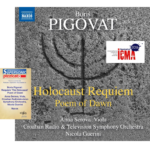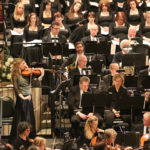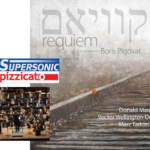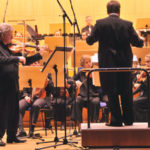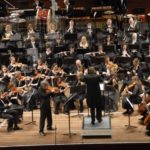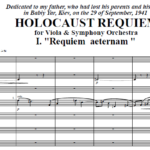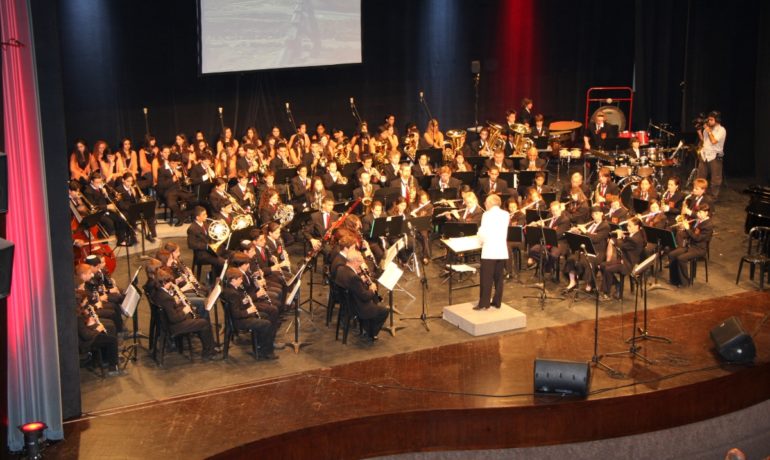

Related posts
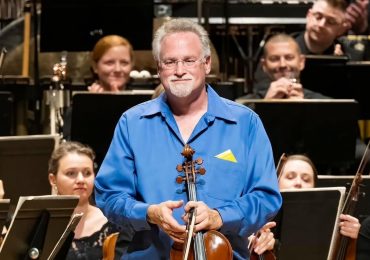
Sep, 2023: the US premiere of the Holocaust Requiem
In Sep 2023, the extraordinary US premiere of Requiem took place in Annapolis by Peter Minkler and Annapolis Symphony Orchestra, conducted by José-Luis Novo.
Peter Minkler wrote:
I have been asked by my dear friend, Boris Pigovat, to write a few words about his significant work, Requiem “The Holocaust” for Viola and Orchestra. He composed this music in memory of his grandparents and aunt who were murdered at Babi Yar in September 1941 on the outskirts of Kyiv.
Mr. Pigovat contacted me about fourteen years ago with the hope that I would be able to persuade anyone in this country to perform his work, as it had not yet received its United States premiere. After listening to Requiem, I was convinced that this is an important and transformative piece that deserves international attention.
After countless inquiries, my long journey was finally over when I was contacted by a local conductor and orchestra willing to tackle this technically challenging, massive 45-minute piece, and I performed the US premiere with Maestro Jose-Luis Novo and the Annapolis Symphony Orchestra in September of 2023. These performances, which took place on the 82nd anniversary of the atrocity, were exceptionally well received with standing ovations, multiple curtain calls and brought many, both on and off stage, to tears.
Throughout the performance, the musicians and audience were silently captivated as the music vividly painted an emotional picture. Other words shared with me and which were used to describe the music included powerful, unsettling, terrifying, gorgeous and deeply moving.
For me, I was both humbled and profoundly honored to bring this haunting music to life. As soloist, I felt compelled to act as storyteller, narrating and weaving together the threads of this tragic event and bringing its aftermath to the fore. Within the six-minute-long cadenza alone, we deftly move from horror to despair to acceptance. The finale, Lux Eterna, ultimately conveys peace, yet is tempered with a stern warning, “Never Again.”
Despite the thousands of miles separating Boris and me, from our very first interaction I felt an unspoken, intense and immediate connection not only with him, but also his oeuvre of extraordinary music. I am privileged to call him Friend.
I would encourage violists around the world to seek out and explore the wealth of magnificent works written for our oft-maligned instrument by Boris Pigovat, a composer who understands and appreciates the beauty and possibilities the viola can offer.
Peter Minkler
Viola
January 4, 2024
All I can add that I am spokeless. Thank you my dear friend Peter for your warm words!
Boris.
Donald Maurice’s solo playing vividly captures the music’s gamut of supplicatory emotion, while Marc Taddei and the orchestra provide an accompaniment richly-mixed with ambiences of faith and trust, doubt and fear.
Wellington, NZ
This is a most extraordinary release. I guarantee it contains music like you’ve never heard before and that will leave you emotionally shattered and physically drained. …the performance and the recording are stunning, impactful, and overwhelming.
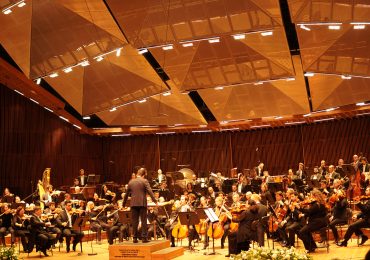
Mar, 2023: "Therefore Choose Life" performance by IPO
An exceptional performance of “Therefore Choose Life” for Symphony Orchestra by the Israel Philharmonic Orchestra, took place in Tel-Aviv in March 2023.
This performance was recorded by MEDICI.TV and broadcasted around the world.
Below you can find the YouTube video from the live recording of the Israeli premiere.
Lahav SHANI, Conductor
Israel Philharmonic Orchestra
Duration: ca. 14 minutes
Picc, 2 Fls, 2 Obs, 2 Cls, B.Cl, 2 Bsns, C.Bn, 4 Hns,
3 Tpts, 3 Tbns, Tba, Timp, Perc (3), Hp, Cel, Str.

